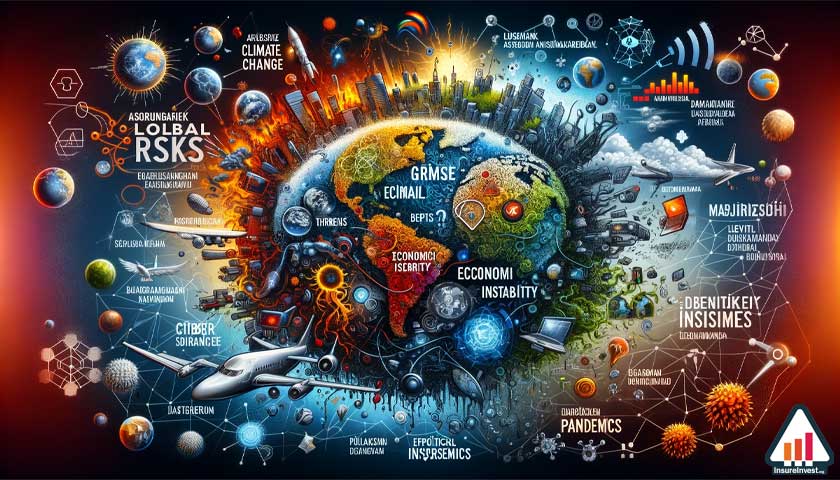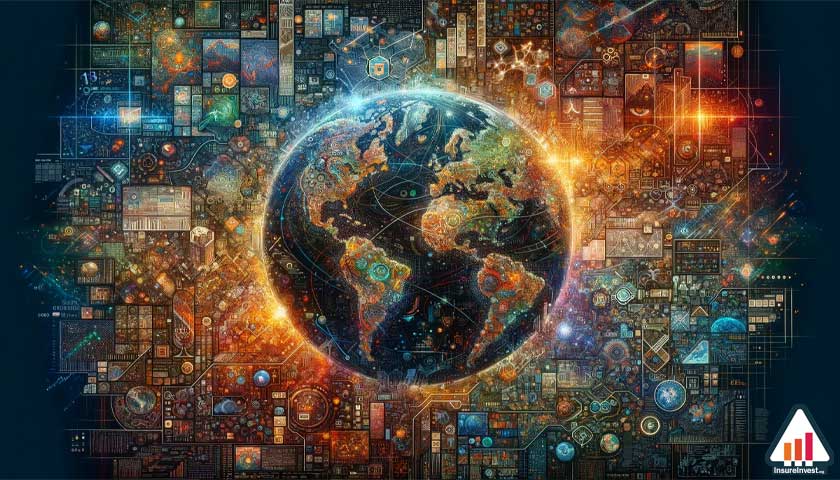The Biggest Global Risks in 2024 and Beyond
As we step into 2024, the world is confronted with a myriad of challenges that transcend borders and demand our collective attention. These challenges, often referred to as global risks, have the potential to reshape societies, economies, and the environment in profound ways. Here, we delve into some of the most significant global risks facing us in 2024 and beyond.
The world is facing a number of major risks in 2024 and beyond. These risks can be divided into two categories: short-term risks and long-term risks.
Short-term risks are those that could have a significant impact on the world in the next few years. Some of the most pressing short-term risks include:
- Climate change is a major threat to the planet and its inhabitants. The effects of climate change are already being felt around the world, and they are expected to become more severe in the coming years. Climate change could lead to more extreme weather events, such as floods, droughts, and heat waves. It could also lead to rising sea levels, which could displace millions of people.
- Geopolitical tensions are another major risk. The world is becoming increasingly divided, and there is a growing risk of armed conflict. The war in Ukraine is a reminder of the dangers of geopolitical tensions.
- Economic instability is also a concern. The global economy is facing a number of challenges, including high inflation, rising interest rates, and supply chain disruptions. These challenges could lead to a recession, which could have a devastating impact on economies around the world.
Long-term risks are those that could have a significant impact on the world over the next few decades. Some of the most pressing long-term risks include:
- Technological change is transforming the world, and it could lead to a number of new risks. For example, artificial intelligence (AI) could lead to job losses, as machines become capable of performing tasks that are currently done by humans. AI could also be used for malicious purposes, such as developing autonomous weapons systems.
- Resource scarcity is another long-term risk. The world’s population is growing, and we are consuming more and more resources. This could lead to shortages of food, water, and energy.
- Biodiversity loss is a major threat to the planet. We are losing species at an alarming rate, and this could have a number of negative consequences, such as disrupting ecosystems and increasing the risk of diseases.
Pandemic Preparedness
The scars left by recent pandemics have underscored the critical need for global preparedness. Ensuring robust healthcare systems, international collaboration on vaccine distribution, and early detection mechanisms are imperative. The ability to respond swiftly to emerging infectious diseases remains a key challenge in safeguarding global health.
Climate Change Escalation
Climate change continues to be a looming threat, impacting ecosystems, weather patterns, and sea levels. In 2024, the urgency to implement sustainable practices, reduce carbon emissions, and adapt to changing climatic conditions is greater than ever. The consequences of inaction could be devastating, affecting vulnerable communities and biodiversity worldwide.
Technological Disruptions
The rapid pace of technological advancement brings both promise and peril. As artificial intelligence, biotechnology, and cybersecurity capabilities evolve, so do the associated risks. Striking a balance between harnessing the benefits of technology and mitigating potential harms, such as cybersecurity threats and ethical concerns, poses a formidable challenge for global governance.
Economic Volatility
The world economy is susceptible to various shocks, including geopolitical tensions, trade disputes, and unforeseen crises. Developing resilient economic structures, diversifying supply chains, and fostering inclusive growth are critical components in navigating the complex landscape of economic volatility.
Biodiversity Loss
The accelerating loss of biodiversity poses a grave risk to ecosystems and the services they provide. Habitat destruction, pollution, and climate change contribute to the decline of numerous species. Conservation efforts, sustainable land use practices, and international cooperation are essential in mitigating the ongoing biodiversity crisis.
Geopolitical Instability
Geopolitical tensions and conflicts persist as significant risk factors. Addressing issues like regional disputes, cyber warfare, and nuclear proliferation requires diplomatic solutions and international cooperation. Striving for peaceful resolutions and fostering dialogue are crucial in promoting global stability.
What can we do for these Global Risks?
Addressing global risks requires a concerted effort from governments, organizations, communities, and individuals. While the magnitude of these challenges may seem daunting, collective action can significantly mitigate their impact. Here are some strategies and actions that can be taken to address the identified global risks:
- Pandemic Preparedness:
- Strengthen national and international healthcare systems, focusing on infrastructure, personnel, and resources.
- Establish early warning systems for infectious diseases and promote global cooperation in sharing information.
- Invest in research and development for new vaccines and antiviral treatments.
- Enhance international collaboration on pandemic response, including the equitable distribution of medical supplies.
- Climate Change Escalation:
- Implement and enforce policies to reduce greenhouse gas emissions and transition to renewable energy sources.
- Invest in climate-resilient infrastructure and sustainable land-use practices.
- Foster international cooperation on climate action and support vulnerable communities in adapting to changing conditions.
- Raise awareness about the importance of individual actions in reducing carbon footprints.
- Technological Disruptions:
- Develop and enforce robust cybersecurity measures to protect against cyber threats and attacks.
- Establish ethical guidelines and regulations for the development and use of emerging technologies like artificial intelligence and biotechnology.
- Promote digital literacy and awareness to empower individuals in navigating the digital landscape safely.
- Encourage international collaboration on technology governance to address global challenges.
- Economic Volatility:
- Diversify and strengthen national and global economies to withstand shocks.
- Encourage inclusive economic policies to reduce income inequality and promote sustainable growth.
- Foster international trade cooperation and resolve disputes through diplomatic channels.
- Implement measures to support vulnerable populations during economic downturns.
- Biodiversity Loss:
- Implement and enforce conservation policies to protect natural habitats and biodiversity.
- Support sustainable land-use practices and reduce pollution to preserve ecosystems.
- Invest in reforestation and habitat restoration projects.
- Promote responsible consumer choices and sustainable resource management.
- Geopolitical Instability:
- Advocate for peaceful conflict resolution and diplomatic dialogue.
- Support international organizations working towards conflict prevention and resolution.
- Foster cultural exchange and understanding to bridge divides between nations.
- Encourage diplomacy and collaboration in addressing shared global challenges.
Individuals, businesses, and communities also play crucial roles in addressing these global risks. By adopting sustainable practices, promoting awareness, and actively engaging in advocacy, each person can contribute to building a more resilient and secure world. Ultimately, a collective and comprehensive approach is necessary to tackle these global risks and create a sustainable future for all.
In the face of these global risks, collaboration, innovation, and informed decision-making are paramount. Governments, businesses, and individuals must work together to build a more resilient and sustainable world. By addressing these challenges head-on, we can forge a path towards a future that is better equipped to navigate the complexities of the 21st century. The year 2024 serves as a call to action, urging us to collectively shape a world that can withstand and overcome the challenges that lie ahead.
These are just some of the major risks that the world is facing in 2024 and beyond. It is important to be aware of these risks and to take steps to mitigate them. By working together, we can help to create a more sustainable and resilient future for the planet.




Living in the UAE, water scarcity is a pressing issue. Sustainable water management and conservation practices are crucial for our region’s future. Let’s raise awareness about the importance of water preservation and encourage responsible usage.
China’s role in addressing global risks is significant. With climate change affecting us all, I believe in promoting sustainable development and green technologies. We should work together to achieve a balance between economic growth and environmental protection.
Geopolitical instability is a concern for many, including us in Mexico. Promoting diplomacy, strengthening international ties, and supporting organizations working towards conflict resolution are essential. It’s time to build bridges and seek peaceful solutions.
In the face of technological disruptions, digital literacy is key. As a French citizen, I advocate for educational programs that empower people to navigate the digital world safely. Governments should prioritize cybersecurity measures to protect individuals and businesses alike.
Living in a rapidly developing country like India, the economic volatility is palpable. I think fostering innovation and supporting local businesses can contribute to economic resilience. We need policies that promote inclusive growth to uplift all sections of society.
The global risks in 2024 demand a united front. As an individual, I believe in the power of education and advocacy. It’s crucial to spread awareness about climate change and encourage sustainable practices. Let’s take responsibility for our actions and inspire positive change for the future.